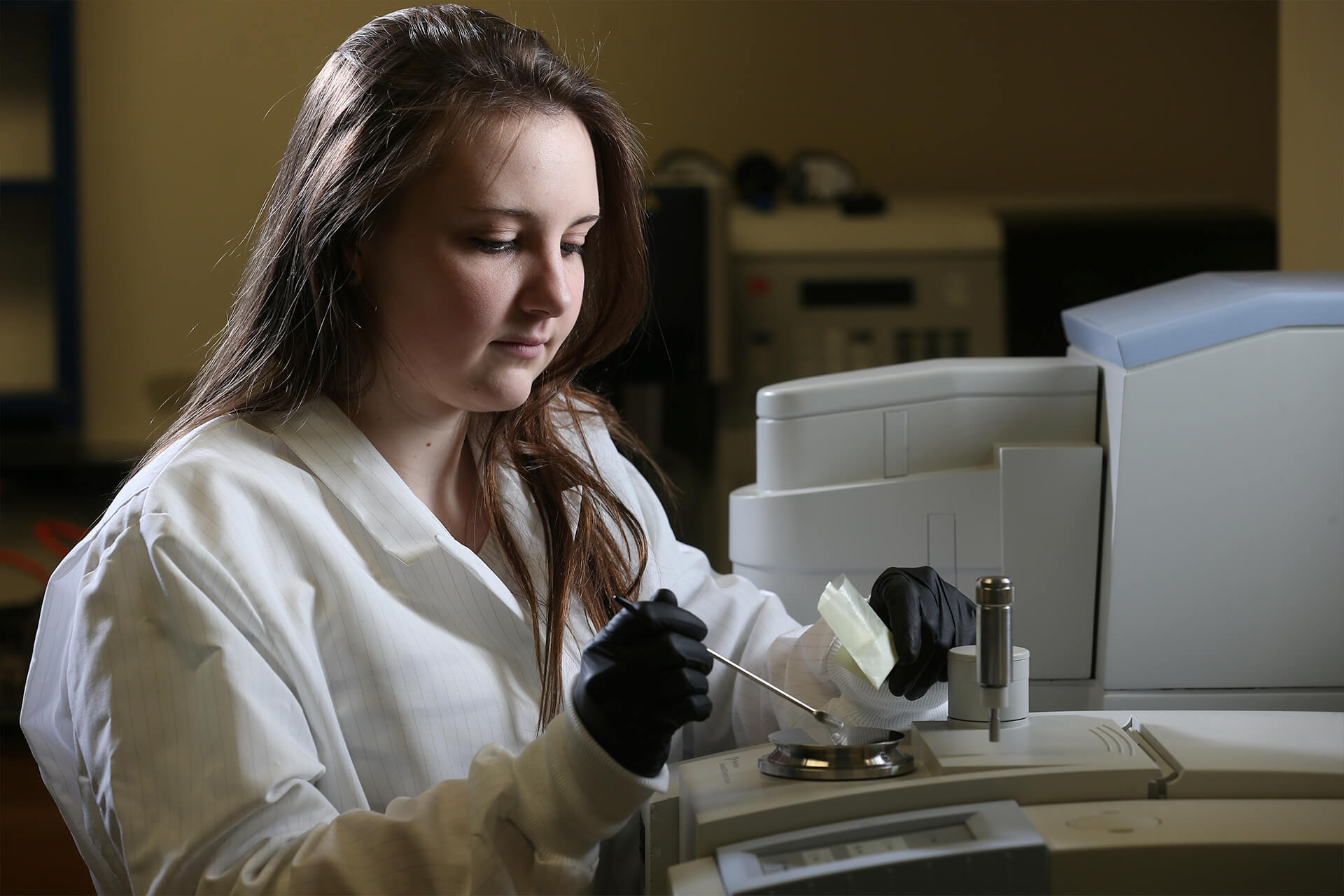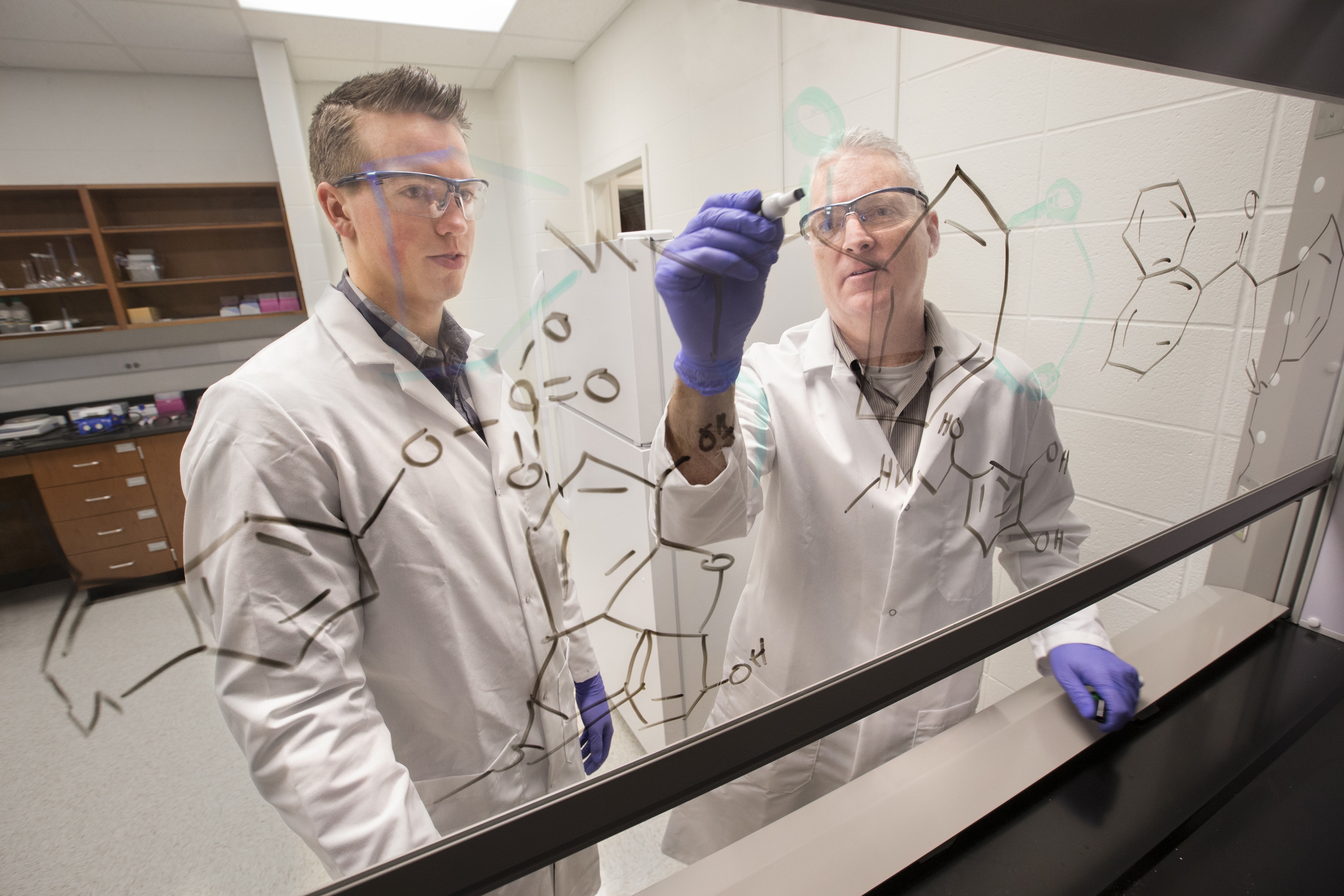Nationally recognized for student experience
The Wall Street Journal

Bachelor of Science (B.S.)
Chemistry: Forensic Chemistry
Forensic chemistry is critical to our justice and regulatory systems. It’s a career path at the intersection of science, industry, law, health and public safety.
The Bachelor of Science in chemistry with a forensic chemistry specialization at BGSU equips you with the skills you need to apply quantitative lab techniques to analyze unknown samples in an investigation. Forensic chemists often work in labs associated with local, state or federal law enforcement, medical examiner’s offices, or private forensic services labs.
Bowling Green State University is nationally recognized as one of the best colleges for forensic science. We are one of the few forensics studies programs in the country with an on-campus crime lab, staffed by 40+ forensic scientists with the Ohio Department of Justice.
Successful forensic chemistry students have strong backgrounds in instrumentation, quantitative analysis, critical thinking skills and written and oral communication skills.
Why study forensic chemistry at BGSU in Ohio?
- Outstanding reputation. Bowling Green State University is nationally recognized for its forensic science programs. We are one of the few programs in the country with an on-campus crime lab, staffed by 40+ of forensic scientists with the Ohio Department of Justice.
- Small class size. Class sizes are intentionally small, allowing for more 1:1 student-faculty interactions and personalized academic support.
- Outstanding faculty. BGSU forensic chemistry faculty are experienced researchers recognized as leaders in the field.
- State-of-the-art facilities. Moseley Hall houses an interdisciplinary science complex featuring flexible laboratory and classroom spaces. Undergraduates are trained to use new instrumentation in our nuclear magnetic resonance (NMR) and mass spectrometry facilities.
- Research opportunities. Undergraduate forensic chemistry students have chances to assist faculty and graduate students on exciting chemistry research projects.
- Join the club. Chemistry Club is a popular academic and social organization connecting chemistry and biochemistry students.
- ACS certification. Forensic chemistry students can satisfy all requirements for American Chemical Society certification with the right choice of electives and several upper-level chemistry courses.
- Graduate options. Take your learning to the next level with a BGSU M.S. degree in chemistry, M.S. in forensic science or a Ph.D. in photochemical sciences.
Forensic chemists continue to be in high demand. Employment for forensic scientists is projected to grow 14% over the next decade.
U.S. Bureau of Labor Statistics
#1 public university in Ohio for career prep
The Wall Street Journal
Career - what can you do with a forensic chemistry degree?
Majoring in chemistry with a specialization in forensic chemistry qualifies BGSU graduates for graduate school or jobs in forensic chemistry labs and many other chemistry fields.
- Work in crime labs, analyzing evidence that helps solve criminal cases.
- Become a toxicologist, analyzing the effects of chemicals on humans and the environment.
- Land a job in pharmacology, testing and developing drugs.
- Get hired in the environmental sector monitoring pollutants and investigating contamination.
- Set your sights on regulatory roles in government and enforce chemical safety standards.
- Pursue a position as a forensic chemistry consultant and provide analysis and expert testimony in legal cases.
Evolving technologies and a growing number of automated processes in forensics chemistry are empowering forensic chemists to work more efficiently and accurately. This is particularly true in ballistics analysis, pattern recognition and nanotechnology.
Career paths
- Forensic science laboratory technician
- Public health officer
- Environmental science/science policy
- Chemical analyst
- Quality assurance and control
- Disease prevention specialist
- Research and development
- Technical sales
- Technical writing
- Nanotechnology
Quick Facts from the Bureau of Labor Statistics
Curriculum
The Bachelor of Science in chemistry with a forensic chemistry specialization is structured for students interested in the application of analytical chemistry to forensic evidence. It’s one of two specializations that chemistry students can choose. The other is biochemistry.
Prospective students should have at least one year of high school chemistry and a strong background in mathematics.
The forensic chemistry degree curriculum offers a strong background in chemistry with additional exposure to aspects of forensic science. Courses cover the major chemistry subdisciplines: analytical, organic, physical, inorganic and biochemistry.
Faculty prioritize hands-on experience in each area so students can learn skills that will be directly applicable to future jobs. Forensic chemistry students have on-campus internship opportunities with faculty members and graduate students on research projects. These positions often lead to publications in professional journals and presentations at regional or national conferences.
Learning outcomes in forensic chemistry include:
- Solid grasp of basic ideas and scope of modern chemistry, including new fields
- Strong problem-solving skills, including mathematical, logical and computational techniques, including use of models to effectively plan projects and critically analyze experimental results
- Skill in developing and carrying out modern laboratory procedures
- Demonstration of independent thinking, communication skills, ability to work effectively within groups and commitment to continuous learning

Sample courses
- Quantitative Chemical Analysis
- Law, Evidence and Procedures
- Forensic Chemistry
- Organic Chemistry
- Physical Chemistry
- Integrated analytical and physical laboratory
- Instrumental methods of analysis
#1 university in Ohio – big or small, public or private – students would choose again
The Wall Street Journal
The forensic chemistry specialization and chemistry program are part of the Chemistry Department in the BGSU College of Arts and Sciences.
Accreditation
Bowling Green State University [BGSU] is accredited by the Higher Learning Commission. BGSU has been accredited by the Higher Learning Commission since 01/01/1916. The most recent reaffirmation of accreditation was received in 2022-2023, with our next reaffirmation of accreditation scheduled for 2032-2033. Questions should be directed to the Office of Institutional Effectiveness.
Request Information
Updated: 11/25/2025 01:01PM

